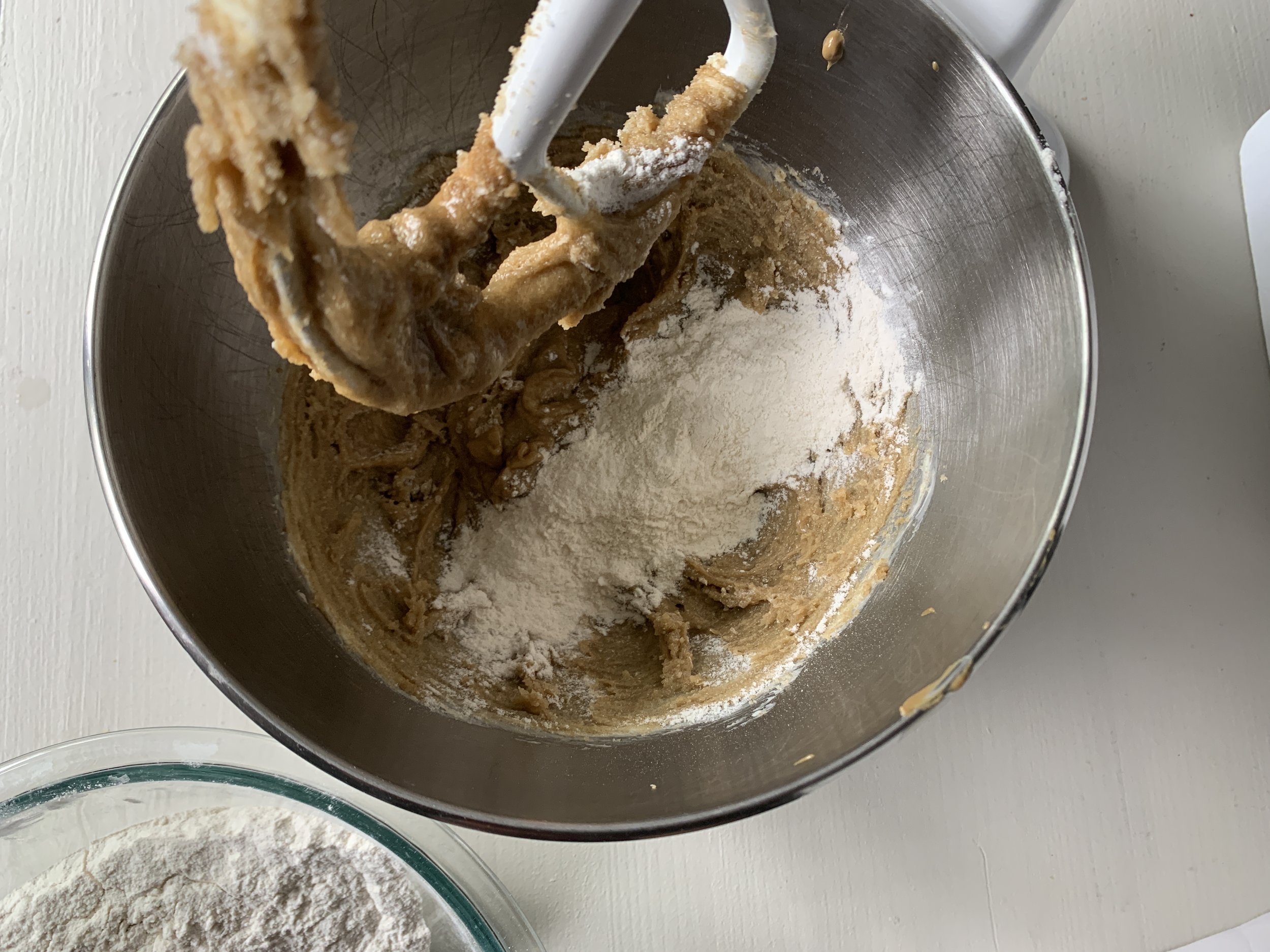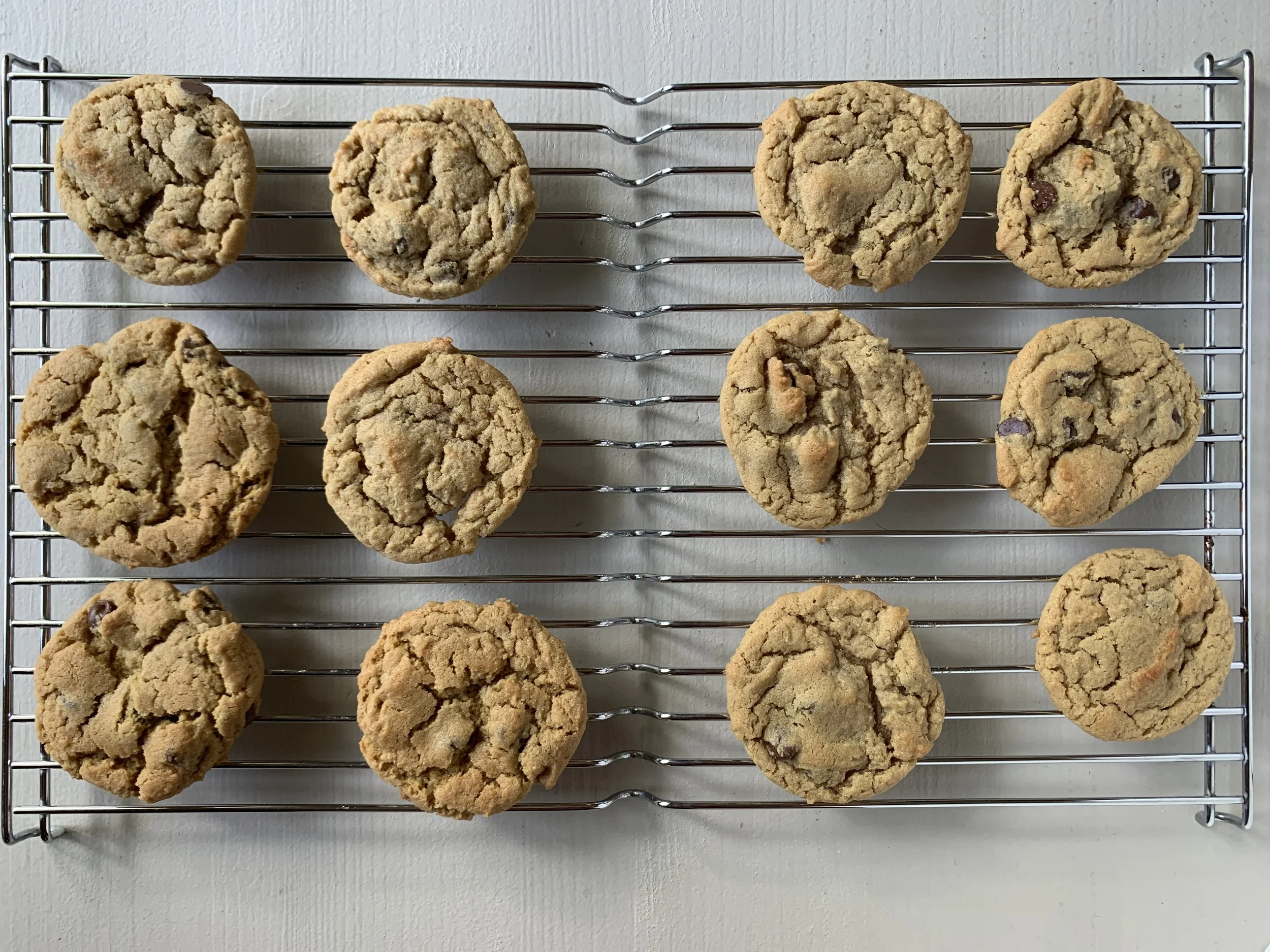Sunflower Butter Chocolate Chip Cookies
Sunflower Butter Chocolate Chip Cookies are soft and chewy with a delicious roasted-flavor. This recipe is a great allergy-friendly option for those with nut allergies!
Have you tried a sunflower butter cookie before?
If not, you should. I highly recommend them as a substitute to peanut butter cookies, especially in a family with a nut allergy.
But sunflower butter cookies can be enjoyed by everyone, regardless of food allergy status. They’re just that good.
I wish had more to say to sell my sunflower butter chocolate chip cookies, but it is late and I’m doing the out-of-bed dance with my toddler right now. Please send help. And bring a batch of these cookies with you. :)
What is sunflower butter?
Sunflower butter is a food paste (think peanut butter consistency) that is made from roasted sunflower seeds. While peanut butter tastes like peanuts, sunflower butter tastes like sunflower seeds but with a more earthy, roasted flavor. Just like peanut butter, you can find sunflower butter sold by different brands and with “no added sugar” options.
Can sunflower butter be substituted for peanut butter?
Yes! Sunflower butter can be spread on a sandwich, used as a veggie or pretzel dip, or added to your favorite smoothie. It also is a great baking substitute for peanut butter cookies.
However, be prepared that while sunflower butter and peanut butter have similar texture, they do not have identical taste. Obviously one is made from sunflower seeds and the other is made from peanuts. For those with a peanut or tree nut allergy, sunflower seed butter can be a safe alternative (for those without a sunflower seed allergy).
Is sunflower butter allergy safe?
Sunflower butter is made from sunflower seeds, so it should not contain peanuts or tree nuts. But just like with everything else, you should check every label, every time. Some brands of sunflower butter may contain soy, but there are other brands that are free from the top eight food allergens. And of course, if you should always do your due diligence to look into a food’s cross contact risk. That can include checking the company’s website or calling the facility to learn more.
While sunflower seeds are not one of the most common food allergens in the United States, it is still possible to be allergic to it. So sunflower butter is obviously not be a safe choice for someone with a sunflower seed allergy.
What are allergy-friendly substitutions for this recipe?
As written, this recipe contains eggs, wheat, milk, and soy. As always, check every label, every time for individual ingredients.
To make egg-free sunbutter cookies: substitute ½ cup applesauce for 2 eggs
To make wheat-free sunbutter cookies: use wheat-free/gluten-free all-purpose flour blend
To make milk-free sunbutter cookies: use Crisco (contains soy) or nondairy margarine instead of butter AND use milk-free chocolate chips, such as Enjoy Life
To make soy-free sunbutter cookies: use a soy-free sunflower butter AND soy-free chocolate chips, such as Enjoy Life
How to make Sunflower Butter Chocolate Chip Cookies:
Step 1: Wash hands with soap and warm water. Gather ingredients and supplies.
Step 2: Preheat oven to 350°F.
Step 3: In a large mixing bowl, cream butter with sugars and sunflower butter on medium speed. Add eggs and mix until evenly distributed.
Step 4b: Add flour mixture slowly into creamed mixture. Add vanilla. Gently fold in chocolate chips and sunflower seeds (if using).
Step 5: Use a small ice cream scoop or large tablespoon to drop rounded dough onto ungreased 13x18-inch baking sheets.
Step 6: Bake at 350°F for 11-13 minutes, or until edges of cookies are golden brown. Cool cookies on baking sheet for 5-10 minutes, then remove to wire cooling rack.
More allergy-friendly baking ideas:
Sunflower Butter Chocolate Chip Cookies
Lisa Woodruff | August 24, 2022
- Prep time: 15 minutes
- Cook time: 40-45 minutes
- Total time: 50-55 minutes
No nuts | No fish | No sesame
Contains eggs, soy (chocolate chips), wheat (flour), and milk (butter, chocolate chips). Sunflower butter may contain soy.
Ingredients:
- 1 cup butter, softened
- 1 cup sugar
- 1 cup brown sugar, lightly packed
- ¾ cup no-sugar-added sunflower butter
- 2 eggs
- 2⅔ cup flour
- 1 teaspoon baking soda
- ½ teaspoon salt
- 2 teaspoons vanilla
- 1 cup semi-sweet chocolate chips
- ¼ cup sunflower seeds (optional)
Instructions:
- Wash hands with soap and warm water. Gather ingredients and supplies.
- Preheat oven to 350°F.
- In a large mixing bowl, cream butter with sugars and sunflower butter on medium speed. Add eggs and mix until evenly distributed.
- In a medium bowl, whisk flour, baking soda, and salt. Add flour mixture slowly into creamed mixture. Add vanilla. Gently fold in chips and sunflower seeds (if using).
- Use a small ice cream scoop or large tablespoon to drop rounded dough onto ungreased 13x18-inch baking sheets.
- Bake at 350°F for 11-13 minutes, or until edges of cookies are golden brown. Cool cookies on baking sheet for 5-10 minutes, then remove to wire cooling rack.
Allergy-friendly Substitutions:
- No eggs: substitute ½ cup applesauce for 2 eggs
- No wheat: use wheat-free/gluten-free all-purpose flour blend
- No milk: use Crisco or nondairy margarine instead of butter AND use milk-free chocolate chips, such as Enjoy Life
- No soy: use a soy-free sunflower butter AND soy-free chocolate chips, such as Enjoy Life






